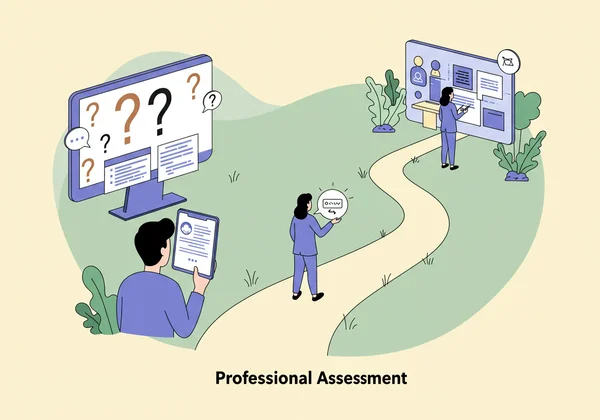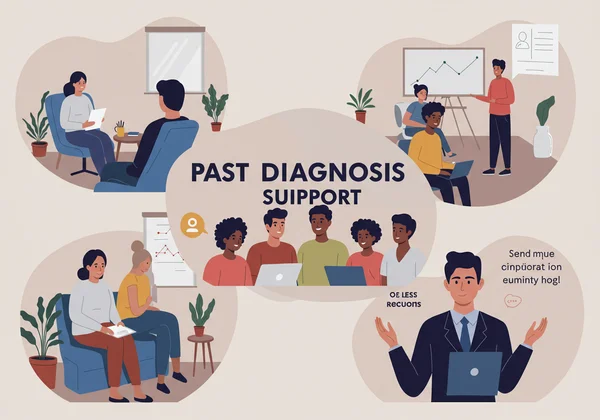Neurodivergent Test & Diagnosis: Your Guide to Professional Assessment
September 7, 2025 | By Morgan Hayes
Feeling "different" can be a profound, lifelong experience. You might notice you process information, socialize, or experience the world in a way that doesn't quite match those around you. While online resources and self-exploration tools offer invaluable initial insights, many find themselves wondering about the next step after taking an online neurodivergent test: a professional neurodivergent diagnosis. So, how do you get tested for neurodivergence? This comprehensive guide will walk you through the entire journey, from understanding the process to finding support, empowering you to pursue clarity with confidence. Your path to self-understanding is valid, and taking the first step can be as simple as beginning to start your journey of discovery.
Disclaimer: This article is for informational purposes only. It is not a substitute for professional medical advice, diagnosis, or treatment. The online neurodivergent test on our platform is a preliminary screening tool designed for self-exploration, not a clinical diagnosis.
The Neurodivergent Test & Diagnosis Process: What to Expect
Starting the journey toward a formal assessment can feel overwhelming, but understanding each step can make it so much clearer and less intimidating. The journey is about gaining a deeper understanding of your unique neurological profile, not about finding something "wrong." It’s a process of validation and empowerment that starts with curiosity and leads to clarity.

Understanding the Difference: Self-Screen vs. Clinical Diagnosis
The first crucial step is to understand the distinction between a self-screener and a clinical diagnosis. Online tools, like a preliminary screening available on our site, are fantastic starting points. They are designed to help you identify potential neurodivergent traits by asking scenario-based questions. These screeners can provide a sense of validation, give you the language to describe your experiences, and indicate whether further exploration might be beneficial.
A clinical diagnosis, however, is a formal medical process conducted by a qualified healthcare professional. It involves a comprehensive evaluation using standardized diagnostic criteria, such as those found in the Diagnostic and Statistical Manual of Mental Disorders (DSM-5). This formal assessment is the only way to receive an official diagnosis of conditions like Autism Spectrum Disorder (ASD), Attention-Deficit/Hyperactivity Disorder (ADHD), or specific learning disabilities.
Initial Steps: Recognizing Traits & Seeking Guidance
Your journey often begins long before you see a specialist. It starts with self-reflection and recognizing traits within yourself that resonate with descriptions of neurodivergence. Perhaps you've always had intense, specialized interests, struggled with executive functions like planning and organization, or experienced sensory sensitivities to light, sound, or touch.
Once you’ve identified these patterns, a great next step is to speak with a trusted primary care physician or a general mental health provider. They can listen to your concerns, rule out other potential causes for your experiences, and provide a referral to a specialist. It’s helpful to come prepared with specific examples of how these traits affect your daily life at work, in school, or in your relationships.
Finding Neurodivergent Specialists & Assessment Types
Once you decide to pursue a formal assessment, the next challenge is finding the right professional and understanding the types of evaluations available. This is a critical part of the process, as the quality of your diagnosis often depends on the expertise of the assessor.
Who Can Diagnose Neurodivergence Through Professional Testing?
Not every healthcare provider is qualified to conduct a formal assessment for neurodivergence, especially in adults. The specialists you should look for include:
-
Clinical Psychologists/Neuropsychologists: These professionals are highly trained in psychological testing and assessment. They are often the best choice for a comprehensive evaluation for ADHD, autism, and learning disabilities.
-
Psychiatrists: As medical doctors, psychiatrists can diagnose neurodevelopmental conditions and are also able to prescribe medication if that is part of the recommended treatment plan.
-
Developmental Pediatricians (for children): These specialists focus on the developmental progress of children and are experts in diagnosing conditions like autism and ADHD in younger individuals.
-
Neurologists: While they primarily focus on disorders of the nervous system, some neurologists specialize in developmental conditions and can be involved in the diagnostic process.

What Kinds of Neurodivergent Assessments Are There?
A thorough neurodivergent assessment is rarely a single test. It's a comprehensive process designed to gather a complete picture of your strengths, challenges, and developmental history. You can expect the evaluation to include several components:
- Clinical Interviews: In-depth conversations about your developmental history, educational and work experiences, social relationships, and current challenges.
- Standardized Questionnaires: You, and sometimes a family member or partner, may be asked to fill out rating scales and checklists that measure specific traits and behaviors.
- Cognitive and Psychological Testing: These are structured tests that assess abilities like memory, attention, executive function, and information processing.
- Direct Observation: For an autism assessment, this might include specific tools like the ADOS-2 (Autism Diagnostic Observation Schedule, Second Edition), which involves a series of structured activities and conversations.
This comprehensive approach helps ensure your diagnosis is accurate, nuanced, and truly captures who you are. You can explore your traits with our preliminary tool to gather some initial thoughts before this professional step.
Preparing for Your Professional Assessment
Preparation can make a significant difference in your assessment experience. Going in with organized information and clear questions helps both you and the clinician have a productive and insightful evaluation. This is your opportunity to advocate for yourself and ensure your story is fully heard.
Gathering Your History and Documentation
Your life experiences are the most important data in this process. Before your appointment, take time for gathering your history. Compile any documents or notes that might be relevant, such as:
-
Old report cards or teacher comments that mention attention, social interaction, or learning style.
-
Previous performance reviews from work.
-
A personal journal where you've noted specific challenges or patterns.
-
A list of key life events and how your traits manifested during those times.
-
Input from a parent, older sibling, or long-term partner who can speak to your childhood development (if you are comfortable with this).

Questions to Ask Your Assessor
It is completely appropriate to interview a potential assessor to ensure they are a good fit, especially regarding their experience with adults, women, or people of color, whose presentations of neurodivergence are often missed. Empowering yourself with information is key. Consider asking:
- What is your experience diagnosing [your suspected neurotype] in adults?
- What does your assessment process involve, and how long does it take?
- What are the total costs, and do you accept insurance?
- What kind of report or feedback can I expect to receive after the evaluation?
Navigating Costs & Post-Diagnosis Support
The practical aspects of getting a diagnosis—namely the cost and what comes after—are major considerations. Planning for these can reduce stress and help you make the most of the clarity a diagnosis can bring.
Funding Your Assessment: Insurance & Financial Aid
Unfortunately, comprehensive neurodivergent assessments can be expensive, and insurance coverage varies widely. Start by calling your insurance provider to ask about coverage for "psychological testing" or "neuropsychological evaluation." Some clinicians do not accept insurance directly, meaning you would have to pay out-of-pocket and seek reimbursement. Don't be discouraged if the cost seems prohibitive. Look into university psychology clinics, which often offer assessments on a sliding scale, or ask providers if they offer payment plans.
Life After Diagnosis: Resources and Next Steps
Receiving a diagnosis is not an endpoint; it's a new beginning. It's a tool that can unlock a deeper understanding of yourself and provide a roadmap for moving forward. Post-diagnosis support is crucial. This can look like:
-
Therapy: Seeking a therapist who specializes in neurodiversity can help you process the diagnosis and develop new strategies.
-
Community: Connecting with other neurodivergent people online or in person can be incredibly validating through organizations like CHADD for ADHD support or the Autistic Self Advocacy Network (ASAN).
-
Accommodations: A formal diagnosis can help you request accommodations at work or school that support your needs.
-
Self-Advocacy: Learning to understand and articulate your needs is one of the most empowering outcomes of a diagnosis.

This newfound clarity helps you better understand your profile and advocate for an environment where you can thrive.
Moving Forward: Embracing Your Unique Neurodivergent Profile
The journey to a neurodivergent diagnosis is a deeply personal one, driven by a desire for understanding and self-acceptance. While a professional assessment provides official clarification, your exploration begins with your own curiosity. Tools like an online neurodivergent test are designed to empower that first step, offering a safe and accessible space to explore your unique neurological landscape. Whether you stop at self-discovery or proceed to a formal diagnosis, the ultimate goal is the same: to embrace your authentic self with compassion and confidence. We encourage you to continue learning, ask questions, and discover your uniqueness on your own terms.
Frequently Asked Questions About Neurodivergent Diagnosis
How do you get tested for neurodivergence?
The process typically involves several steps: first, using a self-screening tool like our online quiz to identify potential traits. Next, discussing your concerns with a primary care doctor for a referral. Finally, undergoing a comprehensive evaluation with a qualified specialist, such as a clinical psychologist or psychiatrist, who will conduct interviews, administer tests, and review your history to make a formal diagnosis.
What are the signs of being neurodivergent?
Signs of being neurodivergent are diverse and vary greatly from person to person. Common traits can include differences in communication and social interaction, deep and specialized interests (often called "special interests"), sensory sensitivities (to light, sound, texture), unique ways of learning and processing information, and challenges with executive functions like planning and organization. Neurodiversity is a broad spectrum, not a single set of symptoms.
Am I neurodivergent or just weird/lazy/anxious?
This is a very common question born from societal misunderstanding. Qualities like "weird" are subjective, while "lazy" is often a misinterpretation of executive dysfunction, a real neurological challenge. While anxiety can co-occur with neurodivergence, persistent, lifelong patterns in your thinking, socializing, and sensory experiences are more indicative of a different neurotype rather than a character flaw. A neurodivergent test can help you start parsing these differences.
Can you be neurodivergent and not have ADHD or autism?
Absolutely. While autism and ADHD are the most commonly discussed forms of neurodivergence, the umbrella term also includes dyslexia (difficulty with reading), dyscalculia (difficulty with math), dyspraxia (difficulty with coordination), Tourette's Syndrome, and others. The neurodiversity paradigm celebrates the idea that there are many natural variations in the human brain.